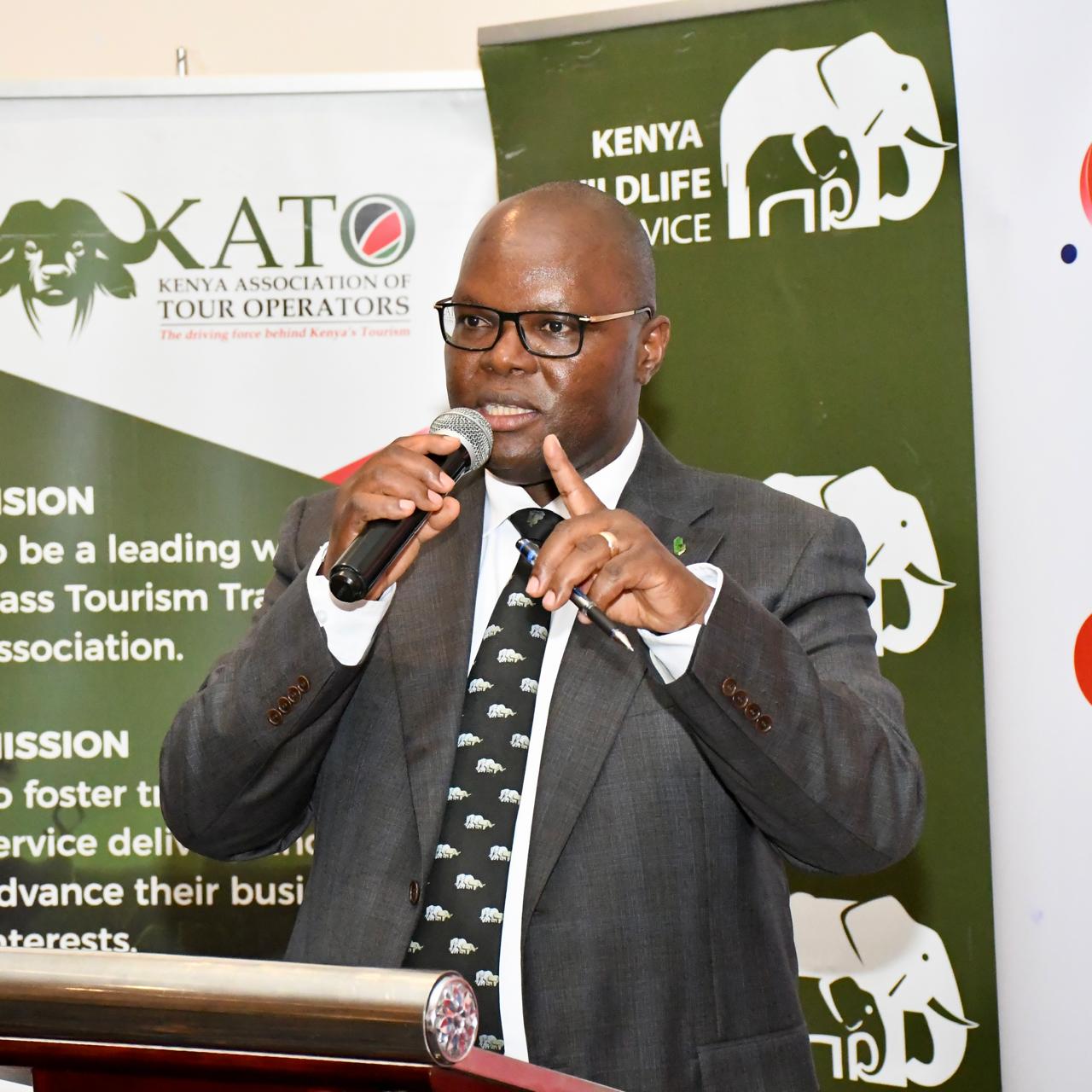The Kenya Wildlife Service (KWS) has intensified its collaboration with the Kenya Association of Tour Operators (KATO) in a bid to enhance wildlife conservation efforts and boost Kenya’s tourism sector.
Speaking at the 46th KATO Annual General Meeting held at the Sarova Woodlands Hotel in Nakuru, Dr. Erustus Kanga, Director General of KWS, emphasized the importance of these partnerships to expand Kenya’s wildlife economy and reinforce the country’s reputation as a top eco-tourism destination.
With a membership base of over 300 operators, KATO plays a crucial role in promoting Kenya’s national parks, contributing a significant 80% of KWS’s tourism revenue.
Dr. Kanga stressed that by working together, KWS and KATO can foster sustainable tourism that preserves Kenya’s biodiversity, creating lasting benefits for the environment and local communities.
He encouraged KATO members to promote lesser-known parks like Meru, Mt. Elgon, Mwea, and Kakamega alongside popular attractions such as Tsavo and Amboseli, offering visitors a broader and more immersive experience of Kenya’s natural heritage.
During the AGM, tour operators raised various concerns impacting Kenya’s tourism industry, such as the need for affordable accommodations, expanded game drive circuits, and greater transparency around new conservation fees.
These factors are seen as crucial for attracting more visitors while maintaining high-quality experiences.
In response to these industry needs, KWS has introduced several initiatives to improve service delivery and enhance visitor satisfaction.
These include installing Starlink internet across national parks and sanctuaries, expanding payment options through the eCitizen platform with PDQ terminals and e-wallets for tour operators, and establishing a 24/7 help desk for customer support.
To further enhance the visitor experience, KWS is upgrading infrastructure, including roads within parks, creating new tourism circuits, and working with the Kenya Roads Board to improve access routes.
Visitor amenities, such as washrooms and merchandise outlets, are also being revamped, with Wi-Fi hotspots added to selected areas.
As Kenya’s tourism sector shifts toward sustainable and experiential travel, Dr. Kanga highlighted the need for eco-friendly tour packages tailored to environmentally conscious travellers.
KWS is expanding its offerings to include night game drives, wildlife translocations, and e-biking, which not only enrich the visitor experience but also encourage longer stays and diversify Kenya’s tourism market.
To attract more visitors, KWS is offering discounted rates for Meetings, Incentives, Conferences, and Events (MICE) in national parks, providing unique venues that support local economies and job creation.
The KWS-KATO partnership is further geared toward addressing critical conservation challenges, such as climate change, pollution, human-wildlife conflict, and declining wildlife populations.
Dr. Kanga urged KATO members to raise awareness of climate change impacts on wildlife, encourage eco-friendly practices like tree planting and plastic-free environments, and educate tourists on responsible wildlife interactions.
Dr. Kanga also appealed to KATO members to support conservation funding through the KWS endowment fund and to involve tourists in conservation activities.
He noted the importance of expanding Kenya’s protected areas from 20% to 30%, with an emphasis on wildlife corridors and dispersal areas to ensure sufficient habitat for wildlife while protecting human settlements.
The diversification of Kenya’s wildlife economy remains a priority.
Dr. Kanga urged tour operators to explore investment opportunities in sustainable tourism infrastructure, such as eco-lodges and tented camps, and to consider consumptive wildlife activities like game farming, which can provide sustainable livelihoods for local communities while supporting conservation goals.
KATO Chief Executive Fred Kaigua expressed appreciation to KWS for arranging a visit to Lake Nakuru National Park, allowing delegates to witness firsthand the park’s revitalization after recent flooding.
“Some of our members have yet to resume selling Lake Nakuru National Park since the last flooding, and this visit provides KWS with a great opportunity to highlight the park’s renewed appeal to key tour operators,” he said.
In conclusion, Dr. Kanga emphasized the significance of the KWS-KATO partnership in advancing Kenya’s conservation and tourism goals.
By joining forces, KWS and KATO are poised to overcome challenges, adapt to emerging tourism trends, and ensure a sustainable future for Kenya’s wildlife and communities.
This partnership not only safeguards Kenya’s natural heritage but also fosters growth in the tourism sector, benefiting both local communities and visitors from around the world.





